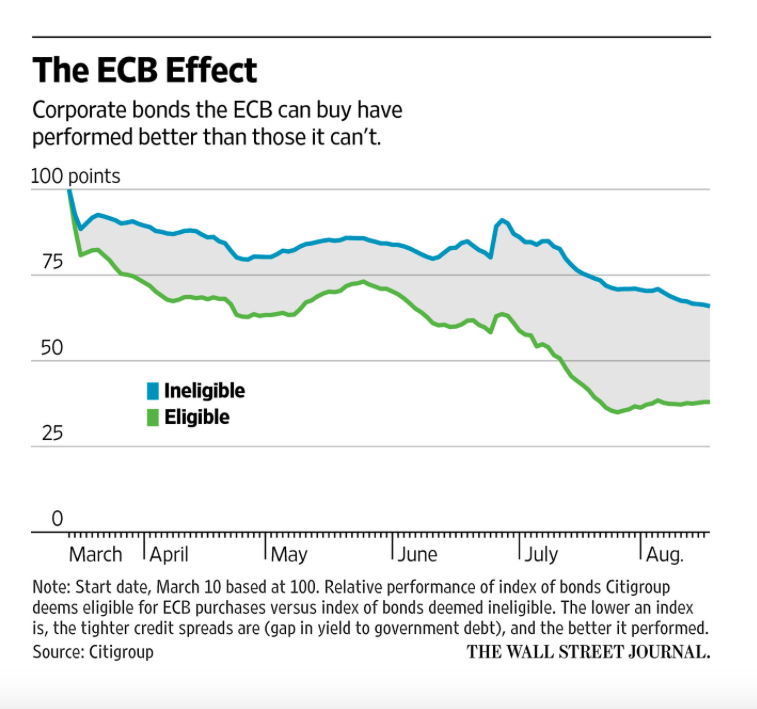As absurd monetary policies continue to foster perverse incentives in the market and a counter-intuitive financial environment, basic economic rules and realistic financial valuations increasingly deviate further from artificially bloated financial markets. Welcome to the modern age of living in the global lab of central bankers.
Europe’s monetary policy and the resulting absurd environment has already created perverse incentives in the markets. We’ve seen a multitude of such cases since the monetary contortionism began. Banks are now officially making good on their promise to pass the costs of negative interest rates onto their clients. Savers everywhere are getting penalized and being charged for their deposits. While QE was supposed to stimulate lending and economic growth, it is instead crippling pension plans and creating debt bubbles. Now, we see a new variety of this systemic malaise, as the ECB has begun buying corporate bonds directly and privately from European companies and banks.
QE on life support
As the market responds and adapts to this absurd environment, the distortions and the unintended consequences of the policies of the European Central Bank become increasingly worrying. The latest example of the results of such perverse incentives can be found in a recently published Wall Street Journal article, reporting on European companies creating new debt, simply because they know that the ECB will buy it.
There are at least two cases, the WSJ reports, in which the ECB directly bought bonds from European firms, through private placements. What this translates to, is that after two years of zealous QE and after boosting its asset purchasing program to €80 billion per month in March (from the previous €60 billion), the ECB eventually started running out of debt to buy. So now private companies are stepping in to fill that gap. They are purposely creating debt packages that match the ECB’s preferences, providing more “fuel” for the bank’s bond purchasing program. Even though the Central Bank cannot directly “place an order” for specific bonds, it does publish its specifications, outlining what constitutes an ECB-eligible bond, and it sends out loud and clear signals of its intentions to buy. Therefore, the incentives are quite straight-forward for private companies and banks, to provide a debt supply to match the ECB’s demand – at the right price.
So far, the ECB’s debt purchasing program has been comprised of already-issued bonds trading in secondary markets, and in March it was confirmed by the Bank that it would at some point include corporate bonds as well. This point came and went, but this is the first time we see the Bank engaging in direct and private debt purchases. According to WSJ’s research and analysis, Morgan Stanley) has so far set up two private placements, with corporate debt bought by the ECB (through the Spanish Central Bank): the Bank of Spain, as of July 1, holds part of €500 million issued by oil company Repsol (OTC:REPYY), while on July 10, it also bought part of another €200 million issued by Spanish power utility Iberdrola (MC:IBE) SA (OTC:IBDRY).
Tip of the iceberg
Private placements are private debt sales that, unlike auctions which would allow access and participation from the broader market, circumvent the need to draft a bond prospectus and present an opportunity for “discreet” transactions with little or no transparency, no press releases, and limited information that would help track and document the volume and the specific details of such purchases. The ECB for its part, announces only which bonds it has bought, but not the actual amounts, thereby making it impossible to estimate how much of this debt it holds.
Private companies and the banks that arrange these sales, see the ECB deals as an opportunity to raise cash quickly and directly, without having to open up the process or to deal with the regulatory complications that an auction would normally involve.
These private placements appear to be only the tip of the iceberg. According to analysts from Citigroup), bonds eligible for ECB purchases have outperformed ineligible ones by roughly 30%, since the bond buying program was announced in March, as shown in the chart above. This reflects the market’s reaction to the ECB emerging as the biggest and keenest customer in the bond market, while this dynamic is widely expected to persist: QE is likely to be extended beyond next March, its planned expiry date.
As absurd policies continue to foster perverse incentives in the market and a counter-intuitive financial environment, this trend appears set to carry on, inflicting further distortions and artificial competitive advantages.

